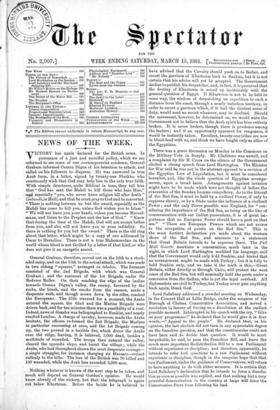There was a grave discussion on Monday in the Commons
on the Military Vote in Supply. Mr. Gladstone was unwell, and a complaint by Sir R. Cross on the silence of the Government elicited a strong speech from Lord Hartington. The Minister for War said he was not in the abstract opposed to a revision of the Egyptian Law of Liquidation, but it must be considered hereafter, and, like the whole question of Egyptian arrange- ments, upon a broad basis. Arrangements against invasion might have to be made which were not thought of before the evacuation of the Soudan became compulsory. As to the littoral of the Red Sea, it must be held by a civilised Power, if only to suppress slavery, or by a State under the influence of a civilised Power ; and the only Power possible was England, for "con- sidering the importance of the Red Sea, as being on the line 'of communication with our Indian possessions, it is of great im- portance that no European Power should have a port on that sea." " There are European Powers which are not averse to the occupation of points on the Red Sea." This is the most distinct declaration yet made about the western shore of the Red Sea, and amounts to a statement that Great Britain intends to be supreme there. The Pall Mall Gazette mentions a conversation, much later in the night, in which Lord Hartington modified his language, said that the Government would only 11)1c1 Snakim, and hinted that an arrangement might be made with Turkey ; but it is folly to hold Suakim only, and we take it the truth is this,—Great Britain, either directly or through Cairo, will protect the west coast of the Red Sea, but will nominally hold the ports under a concession from the Sultan, who is yet the legal overlord. All diplomatists are civil to Turkey, but Turkey never gets anything back again, thank God.


































